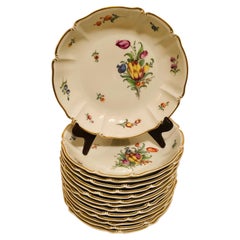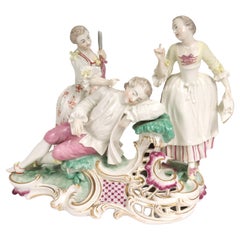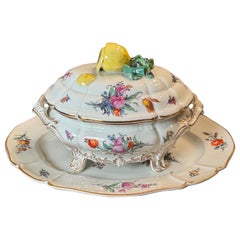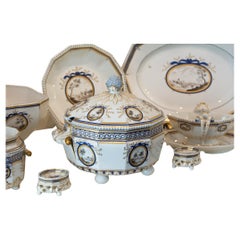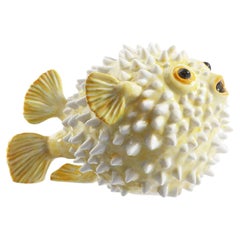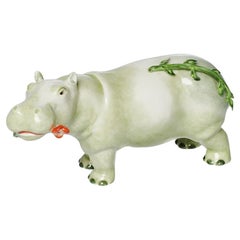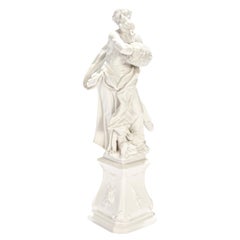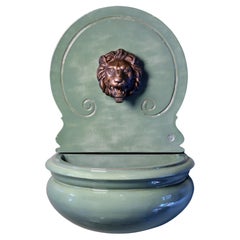Nymphenburg Porcelain
Nymphenburg — one of Europe’s most venerable porcelain factories — was founded near Munich in 1747 by Maximilian III Joseph, the elector of Bavaria. It didn’t begin producing under the name we know today, however, until 1761, when it was moved to Nymphenburg Palace.
Porcelain was invented in East Asia around 2,000 years ago, and its formula, which requires a special clay called kaolin, became a closely guarded secret. It wasn’t until the early 1700s that chemists at Meissen, Germany, in the employ of Augustus II the Strong, the elector of Saxony, discovered a process for making true, as opposed to soft-paste, porcelain. Soon factories across Europe were producing fine porcelain services and sculpture for an elite clientele.
Nymphenburg was one of these factories, manufacturing elaborate services for dinner, dessert, coffee and tea, and sculptures for the Bavarian nobility. Round objects, such as Nymphenburg plates and vases, were turned on potter’s wheels, while more complex ones, like figures, were slip cast in molds. This technique ensured that the pieces’ dimensions were precise and consistent. Once shaped, they were fired and, after that, hand-decorated by experienced china painters, who finished each to exacting standards.
Among Nymphenburg’s most famous objects are its lively and charming Rococo-style figurines, most often depicting Commedia dell'Arte characters or exotic Chinese figures. Today, the company makes versions of its historic figurines with updated forms and decorations by such designers as Christian Lacroix and Vivienne Westwood.
It also still makes one of its earliest, and eternally popular, china patterns: the floral Cumberland, created in 1765 by Franz Anton Bustelli as the electoral court service. Cumberland is one of more than 20,000 patterns housed today in Nymphenburg’s archive, enabling owners of incomplete sets to find replacements. In addition, the company has engaged contemporary designers such as Ted Muehling and Hella Jongerius to create witty new designs that celebrate the firm’s history while giving it a fresh spin.
Find authentic Nymphenburg Porcelain decorative objects, tableware and other items on 1stDibs.
| Average Sold Price |
| $1,008 |
| Styles |
| Materials |
| Related Creators |
1940s German Romantic Vintage Nymphenburg Porcelain
Porcelain
Early 20th Century German Rococo Nymphenburg Porcelain
Porcelain
Early 20th Century German Art Nouveau Nymphenburg Porcelain
Porcelain
20th Century German Louis XVI Nymphenburg Porcelain
Porcelain
2010s German Modern Nymphenburg Porcelain
Porcelain
2010s German Modern Nymphenburg Porcelain
Porcelain
20th Century German Rococo Nymphenburg Porcelain
Porcelain
2010s German Mid-Century Modern Nymphenburg Porcelain
Majolica
Nymphenburg Porcelain Sale Prices
| Sold Date | Sold Price | Category | Material | Creation Year | ||||||||||||||||
|
| $1,008 |
Average sold price of items in the past 12 months |
| $800-$1,233 |
| Sold price range of items in the past 12 months |
Creators Similar to Nymphenburg Porcelain
Nymphenburg Porcelain furniture for sale on 1stDibs.
- 1stDibs ExpertFebruary 1, 2024To date Nymphenburg porcelain, look for a maker's mark in an inconspicuous area. Since its commission in 1754, the porcelain factory has used a wide range of marks to identify its pieces. By comparing the mark on your porcelain ware to images shared on trusted online resources, you can approximate its age. For example, a coat of arms marking above the brand's wordmark and the number 1754 indicate a piece produced in 2008 or after. If you have difficulty determining the age of a particular piece, a knowledgeable appraiser or antique dealer can assist you. Find a diverse assortment of Nymphenburg porcelain ware on 1stDibs.
